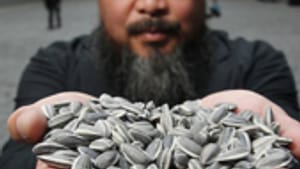Stay in the Loop
BSR publishes on a weekly schedule, with an email newsletter every Wednesday and Thursday morning. There’s no paywall, and subscribing is always free.
One artist with courage makes a majority
"Ai Weiwei: Never Sorry,' at the Ritz Five

Debates about artists and the function and meaning of the arts in contemporary society are as complex today as in any time in history. My view of the subject is that the current realms and productions in art worlds are extraordinary. Artists and collaborating forces in diverse communities are consistently creating vital new work locally and worldwide.
If there's a problem with the arts, it can be attributed in part to a media-centered culture and audiences that have come to respond only to blockbuster effects and "masterpieces." This thinking diminishes the ways that living artists grow and develop.
The art of the past is valuable and necessary for a collective sense of history. Contemporary artists, creating conversations in the moment and stimulating strong discussions, build worlds within worlds of common knowledge and experience. (Think, for example, of the talk and activities the occur during the weeks of the Philadelphia Live Arts Festivals.)
Art is now an international language. Thanks to our networked and Twittered world, art can talk directly to artists, and they can talk back to you.
Art is more necessary than ever— not only to provide images, forms and experiences outside of the commercial media, but also to sustain intelligent engagement that transcends the pronouncements of "official" culture and governments.
Promoted on Twitter
All of these notions, and more, are explicitly evident in Alison Klayman's graceful and solid new documentary, Ai Weiwei: Never Sorry. Thanks to the Internet and Twitter— both of which he has used— Ai Weiwei might be the world's most famous artist.
Ai Weiwei, son of a dissident Chinese poet who was persecuted during Mao's Cultural Revolution, first came to prominence as the architect of the Bird's Nest Stadium for the 2008 Beijing Olympics. His take on that accomplishment is a series of photographs that appear on-line and in the film, where he prominently flips the bird to the structure after learning about the Chinese government's treatment of poor residents near the area.
In a number of other videos and photographs, Ai Weiwei is not shy about giving the finger and telling the Chinese authorities to "Fuck off." No doubt he learned those precise and eloquent aesthetic forms of signification during the 12 years (1981-93) that he lived in Lower Manhattan, as Klayman's film recounts.
Klayman followed Ai Weiwei for more than two years. We find him often smiling yet serious, intense and managerial, open to every question and physically combative with policemen (who deny having beat him on a visit to the city of Chengdu)— in short, he's the archetypal complicated politically active artist/hero.
A mother's concern
This well-paced and well-edited portrait, during which Ai Weiwei often speaks directly to Klayman, is intercut with footage of TV interviews and material shot by the artist's assistants. A cool sound track glides the viewer along as Ai Weiwei talks and Klayman provides a mini-tour of China today.
Klayman's film portrays an activist who is fearless (though he admits to being fearful). Ai Weiwei is shown variously overseeing the production of his work, on his laptop Twittering away, and visiting with his family. His mother frets over him; yet, when asked, she speaks forthrightly about the unconscionable actions of Chinese authorities. Typical and minimally helpful commentary by fellow artists, curators, museum officials and arts writers flesh out the film. You get the feeling that just talking about Ai Weiwei could cause trouble.
Ai Weiwei's work ranges from the gestural"“ he is filmed dropping ancient Chinese vases on the ground and painting over "valued" antiques"“ to the monumental. For London's Tate Gallery, he spread 100 million hand-painted sunflower seeds on the museum's gallery floor. As a response to the secrecy of government bureaucrats concerning shoddy school construction, he and his team collected the names of 5,212 children who died as a result of the 2008 Sichuan Earthquake. One year later he broadcast a reading of all the names (by voices supplied to him by his blog and Twitter followers).
Klayman presents these episodes with clarity and respect. Ai Weiwei is a star, but also a relentless worker.
Banned from travel
It might be too obvious to say that Ai Weiwei's intent as an artist is to simply represent the damn obvious facts of the reality of life in a country where the ruling party conceals and obscures what is right in front of everyone's eyes and cameras. For this work, as this 91-minute film shows, Ai Weiwei's studio was destroyed and he was detained for 81 days in 2011. It is work that may yet cost him his life.
Currently he's unable to travel outside Beijing, so Ai Weiwei tweets and lets his art speak for him. The tweets are not casual updates but charged statements that combine folk aphorisms with individualistic affirmations, like, ''If we don't push, nothing happens" and "I don't want the next generation to fight the same fights I did." That's the voice of an artist who understands that art and sensibility are inseparable.
If there's a problem with the arts, it can be attributed in part to a media-centered culture and audiences that have come to respond only to blockbuster effects and "masterpieces." This thinking diminishes the ways that living artists grow and develop.
The art of the past is valuable and necessary for a collective sense of history. Contemporary artists, creating conversations in the moment and stimulating strong discussions, build worlds within worlds of common knowledge and experience. (Think, for example, of the talk and activities the occur during the weeks of the Philadelphia Live Arts Festivals.)
Art is now an international language. Thanks to our networked and Twittered world, art can talk directly to artists, and they can talk back to you.
Art is more necessary than ever— not only to provide images, forms and experiences outside of the commercial media, but also to sustain intelligent engagement that transcends the pronouncements of "official" culture and governments.
Promoted on Twitter
All of these notions, and more, are explicitly evident in Alison Klayman's graceful and solid new documentary, Ai Weiwei: Never Sorry. Thanks to the Internet and Twitter— both of which he has used— Ai Weiwei might be the world's most famous artist.
Ai Weiwei, son of a dissident Chinese poet who was persecuted during Mao's Cultural Revolution, first came to prominence as the architect of the Bird's Nest Stadium for the 2008 Beijing Olympics. His take on that accomplishment is a series of photographs that appear on-line and in the film, where he prominently flips the bird to the structure after learning about the Chinese government's treatment of poor residents near the area.
In a number of other videos and photographs, Ai Weiwei is not shy about giving the finger and telling the Chinese authorities to "Fuck off." No doubt he learned those precise and eloquent aesthetic forms of signification during the 12 years (1981-93) that he lived in Lower Manhattan, as Klayman's film recounts.
Klayman followed Ai Weiwei for more than two years. We find him often smiling yet serious, intense and managerial, open to every question and physically combative with policemen (who deny having beat him on a visit to the city of Chengdu)— in short, he's the archetypal complicated politically active artist/hero.
A mother's concern
This well-paced and well-edited portrait, during which Ai Weiwei often speaks directly to Klayman, is intercut with footage of TV interviews and material shot by the artist's assistants. A cool sound track glides the viewer along as Ai Weiwei talks and Klayman provides a mini-tour of China today.
Klayman's film portrays an activist who is fearless (though he admits to being fearful). Ai Weiwei is shown variously overseeing the production of his work, on his laptop Twittering away, and visiting with his family. His mother frets over him; yet, when asked, she speaks forthrightly about the unconscionable actions of Chinese authorities. Typical and minimally helpful commentary by fellow artists, curators, museum officials and arts writers flesh out the film. You get the feeling that just talking about Ai Weiwei could cause trouble.
Ai Weiwei's work ranges from the gestural"“ he is filmed dropping ancient Chinese vases on the ground and painting over "valued" antiques"“ to the monumental. For London's Tate Gallery, he spread 100 million hand-painted sunflower seeds on the museum's gallery floor. As a response to the secrecy of government bureaucrats concerning shoddy school construction, he and his team collected the names of 5,212 children who died as a result of the 2008 Sichuan Earthquake. One year later he broadcast a reading of all the names (by voices supplied to him by his blog and Twitter followers).
Klayman presents these episodes with clarity and respect. Ai Weiwei is a star, but also a relentless worker.
Banned from travel
It might be too obvious to say that Ai Weiwei's intent as an artist is to simply represent the damn obvious facts of the reality of life in a country where the ruling party conceals and obscures what is right in front of everyone's eyes and cameras. For this work, as this 91-minute film shows, Ai Weiwei's studio was destroyed and he was detained for 81 days in 2011. It is work that may yet cost him his life.
Currently he's unable to travel outside Beijing, so Ai Weiwei tweets and lets his art speak for him. The tweets are not casual updates but charged statements that combine folk aphorisms with individualistic affirmations, like, ''If we don't push, nothing happens" and "I don't want the next generation to fight the same fights I did." That's the voice of an artist who understands that art and sensibility are inseparable.
What, When, Where
Ai Weiwei: Never Sorry. A film directed by Alison Klayman. At the Ritz Five, 220 Walnut St. (215) 725-7900. For show times, click here.
Sign up for our newsletter
All of the week's new articles, all in one place. Sign up for the free weekly BSR newsletters, and don't miss a conversation.
 AJ Sabatini
AJ Sabatini